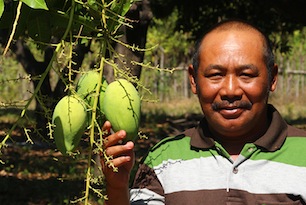A Budding New Business
Improving mango farmers’ income with early flowering technology
 Mangoes are Indonesia’s largest fruit crop. However, despite a high domestic demand for mangoes, the popular Indonesian variety of Arumanis attracts a very low market price. The reason for this low price is a seasonal oversupply during the peak season from October to November. Smallholder mango farmers get caught in a vicious cycle where the low price for the crop makes them reluctant to invest in improvements for their trees thus leaving them stuck in a low-return, low-investment model.
Mangoes are Indonesia’s largest fruit crop. However, despite a high domestic demand for mangoes, the popular Indonesian variety of Arumanis attracts a very low market price. The reason for this low price is a seasonal oversupply during the peak season from October to November. Smallholder mango farmers get caught in a vicious cycle where the low price for the crop makes them reluctant to invest in improvements for their trees thus leaving them stuck in a low-return, low-investment model.
PRISMA, a bilateral program supported by the Australian Department of Foreign Affairs and Trade (DFAT) and Bappenas, noted this problem. PRISMA determined that one way to assist smallholder mango farmers in West Nusa Tenggara (NTB) and East Java would be to increase mango production in the off-season, allowing farmers to benefit from better prices when demand was high.
PRISMA partnered with PT Syngenta Indonesia, a leading agrochemical company (Syngenta), to introduce early flowering technology to smallholder farmers. The technology uses a combination of chemicals to encourage early flowering – Cultar, which contains paclobutrazol to stimulate the early flowering, and a fungicide called Amistartop, to control flower drop. Syngenta was interested in the project because they saw the prospects for increasing their sales of these two products.
Based on PRISMA's mango value chain assessment, the partnership decided that the most cost-effective and efficient way of raising awareness of the benefits of this innovation was by working with mango collectors. The collectors have significant outreach to many farmers and also stand to benefit from the introduction of the early flowering technology. Syngenta identified the collectors as the prime agents of change for this technology.
Syngenta now trains local collectors in the correct use of the chemicals so that they can provide this knowledge and inputs to smallholder farmers who would otherwise not be able to afford or correctly use the technology.
Pak Muksin, a collector in Sukadana Village in Lombok, NTB, was invited by Syngenta to join the program as one of their agents in 2014. “I used to be a little bit wary of using paclobutrazol, because I had tried it before but always failed. They were able to get the trees to flower but then the flowers would rot. I now know from the Syngenta agronomist, Pak Yazid Bustomi, that the farmers were applying it incorrectly," explains Pak Muksin.
“Syngenta chose me as an agent because I was keen to learn the proper application technique and because I was prepared to invest in the chemicals,” he continues.
Pak Muksin now provides a range of services to farmers in NTB including training in pruning, fertiliser use, and spraying for early flowering. Pak Muksin also sells the products to the farmers in small, more affordable quantities.
Pak Aris is one such farmer who has received services from Pak Muksin. “I own 50 mango trees on a 0.8 hectare block, which I usually rent out. I only get Rp. 6,000 per tree. I choose to rent out my trees because I get almost nothing for my crop otherwise. But with this new technology I will cultivate the trees myself," says Pak Aris.
The local farmers have now been convinced of the new technology as a result of a demonstration plot, which has been established by Pak Muksin with assistance from Syngenta.
“I applied the early flowering technology and pruned and fertilised my trees according to the way Pak Yazid and the other agronomists trained me. It is now only September and I've had to use bamboo sticks to prop the trees up as they're so full of fruit!" says Pak Muksin, beaming. "This is what convinced the farmers in my area to give it a try.
“I was able to sell unripe mangoes for Rp. 4,000 per kilogram in the local market for rujak (an Indonesian speciality fruit salad using unripe fruits) in August. And the ripe fruit I have sold for up to Rp. 6,000 per kilogram. The peak season price is usually 1,500-2,500 rupiah per kilogram. That’s a big increase in price.”
Pak Aris, the smallholder farmer who used to rent out his trees for almost nothing, is a few weeks away from harvesting his own crop. “Last year I received Rp. 300,000 from renting out my trees. This year, based on Pak Muksin’s experience, I should get approximately 6 million rupiah for my harvest. My wife almost can’t believe it!" says Pak Aris, laughing.
“At first she was sceptical because I had to pay for the chemicals myself. This is a significant outlay for us at Rp. 20,000 per tree. I also have to provide labour for pruning and pay for fertiliser," he explains. "However, I can get the chemicals from Pak Muksin on credit with no interest and then he takes it out of my harvest price when he collects the mangos. This works well for both of us.”
PRISMA has calculated that even if 50% of the production is shifted to the off-season months, they can more than double their net income. The program aims to benefit more than 17,400 farmers and 2,400 collectors in NTB and East Java by 2018.
“I am grateful to learn about early flowering properly," says Pak Aris. “The added income will be a significant burden lifted from our shoulders.”